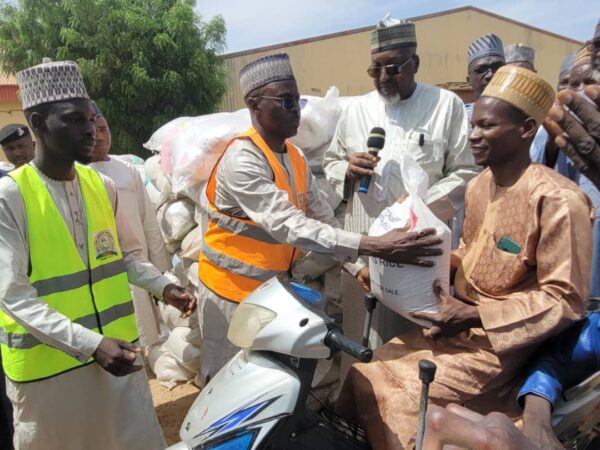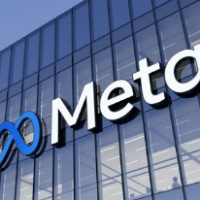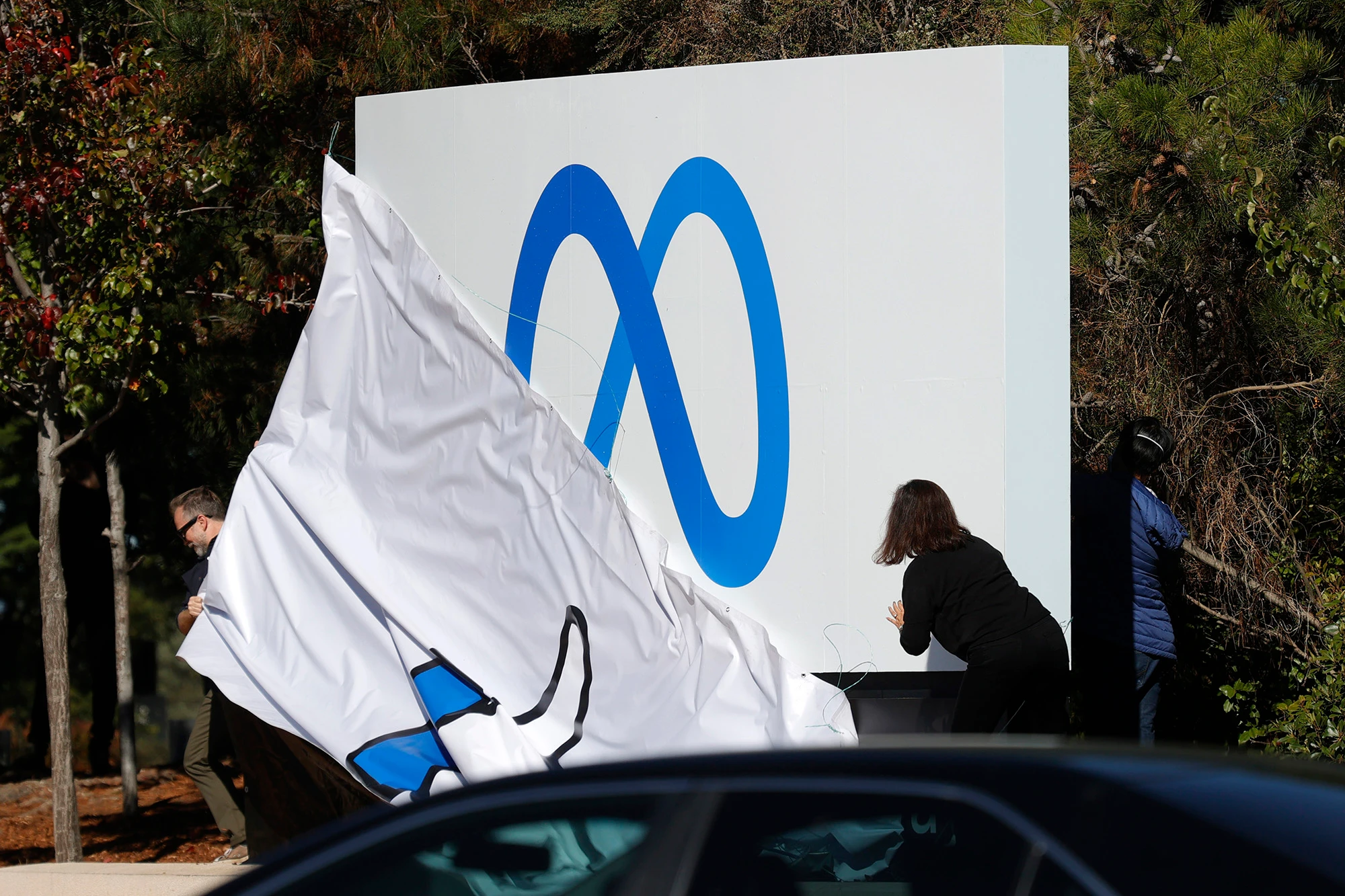Business
Meta Removes 63,000 Accounts In Sweep Against ‘Yahoo Boys’ Scams
Meta Platforms Inc., the parent company of Facebook, Instagram, and WhatsApp, has removed 63,000 accounts linked to the infamous “Yahoo Boys” scam network.
The social media giant disclosed this in its Q1 2024 Adversarial Threat Report released on Wednesday.
The accounts, which were used for financial sextortion and distributing blackmail scripts, were deleted in recent weeks as part of an extensive crackdown.
The company disclosed that a separate network of about 2,500 accounts, associated with roughly 20 individuals, predominantly targeted adult men in the United States using false identities.
RELATED NEWS: FCCPC Fines Meta $220 Million For Data Privacy Violations
Meta’s action was driven by advanced technical detection and thorough investigations, which have bolstered its automated systems against such threats.
Meta highlighted the global nature of financial sextortion, a crime increasingly driven by Yahoo Boys, a loosely organized group of cybercriminals primarily based in Nigeria.
The company noted it had dismantled a coordinated effort involving these accounts, as well as Facebook accounts, Pages, and groups linked to the scammers that were seeking to recruit and train new members.
While most of the scams were unsuccessful, Meta reported some incidents targeted minors, which have been referred to the National Center for Missing and Exploited Children.
The social media giant said “Financial sextortion is a borderless crime, fueled in recent years by the increased activity of Yahoo Boys, loosely organised cybercriminals operating largely out of Nigeria that specialize in different types of scams.
“We’ve removed around 63,000 accounts in Nigeria attempting to target people with financial sextortion scams, including a coordinated network of around 2,500 accounts.”
“We’ve also removed a set of Facebook accounts, Pages, and groups run by Yahoo Boys—banned under our Dangerous Organizations and Individuals policy—that were attempting to organize, recruit and train new scammers.”
The company also collaborated with other tech firms through the Tech Coalition’s Lantern program to address these scams across various platforms.
Additionally, Meta removed around 7,200 assets in Nigeria, including 1,300 Facebook accounts, 200 Pages, and 5,700 groups that were disseminating scam-related materials which were involved in offering scam scripts, guides, and fake account photos.
Following the disruption, Meta’s systems have been rigorously blocking attempts by these groups to reappear and are continuously refining their detection methods.
The company has been actively partnering with law enforcement, assisting with investigations and prosecutions by responding to legal requests and alerting authorities to potential threats.
Meta’s efforts go beyond account removal. It also supports Project Boost, an initiative funded in collaboration with the National Center for Missing and Exploited Children (NCMEC) and the International Justice Mission, which trains law enforcement agencies globally on managing and acting upon NCMEC reports.
The firm said “We’ve conducted several training sessions so far, including in Nigeria and the Cote d’Ivoire, with our most recent session taking place just last month,”
To enhance user protection, especially for teens, Meta has introduced stricter messaging settings for users under 16 (or under 18 in some countries) and now displays safety notices to promote cautious online behavior.
Recall that last week, Meta was fined $220 million by Nigeria’s Federal Competition and Consumer Protection Commission (FCCPC) for violating data protection laws related to WhatsApp. The investigation, which began in May 2021, revealed that Meta’s privacy policies infringed on user rights through unauthorized data sharing and discriminatory practices.
Meta intends to appeal the decision, disputing both the findings and the penalty. The FCCPC’s actions are aimed at ensuring fair treatment of Nigerian users and adherence to local regulations.
Business
Dangote Feeds 50,000 In Kebbi, Gombe States

In continuation of its 2025 Annual National Food Intervention Programme, the Aliko Dangote Foundation (ADF), has distributed 50,000 bags of rice to poor and vulnerable families in Kebbi and Gombe States.
Flagging off the distribution of the intervention in Aliero Local Government Area of Kebbi State on Thursday (yesterday), the Kebbi State Commissioner for Special Duties, Alh Zayyanu Aliero, said the gesture was in line with the core values of the Foundation’s founder, Alh Aliko Dangote.
“This is commendable gesture, especially as it will improve the living conditions of the poor and most vulnerable people in the state.
“The distribution is in collaboration between the Foundation and the state government to ensure that the food reaches the most vulnerable individuals in each of the 21 LGAs of the state,” he said.
ALSO READ: Uromi Killings: FG, Edo State Set Up Fact-Finding Committee
The commissioner lauded the ADF for the kind gesture, noting that it was the second edition of the foundation’s gesture to the vulnerable people in the state.
He disclosed that, “Out of the 25,000 bags of the rice allotted for the 21 LGAs of the state, 20 LGAs would get 1,000 each while Birnin Kebbi LGA, which is the highest in population, will get 3,000 bags and the other vulnerable people will get 1,000 bags of the rice.
“The distribution formula we have adopted for all the LGAs is, 150 bags for persons living with disability, 100 for deaf, 100 for blind, 20 for leper, 10 for albino people; 120 for imams, 100 for traditional rulers, divorcees 100, widows 150, Dan-Agaji group 50, and other vulnerable 100,” he noted.
Zayyanu Aliero explained that the partnership had helped the government to reach vulnerable residents efficiently, through community structures that understood local needs.
The commissioner revealed that Gov. Nasir Idris, “has introduced various initiatives to mitigate the economic challenges facing the people in recent times in the state.”
On their part, the Chairman of Aliero and Gwandu LGAs, Alhaji Abubakar Jadi, represented by his Vice Alhaji Aliyu Abubakar, and Alhaji Atiku Ahmad-Mandiya, lauded the foundation and the efforts of the state government for providing succour to the needies and the less- privileged members of the LGAs in the state.
They urged the beneficiaries to continue praying for the state and the nation, saying Gov. Nasir Idris’ administration remained committed to supporting vulnerable communities.
On behalf of the beneficiaries, Alhaji Anas Gwandu, thanked Alhaji Aliko Dangote for providing the food item, while praising him for thinking it wise to intervene in the lives of the beneficiaries.
Anas appealed to other well-to-do individuals to emulate Dangote by supporting those in need.
“As I am talking to you now, we have more than 600,000 people living with disabilities and they need special attention and assistance.
“The gesture as such will alleviate some of the challenges face by the poor, widows, divorcees, and most vulnerable people in the society, hence they need for all our wealthy individuals to emulate the foundation’s gesture,” he urged.
Meanwhile, in Gombe State, the donation was handed over to the state government, through Alhaji Abubakar Inuwa Kari, the Chief of Staff to Governor Muhammadu Inuwa Yahaya, to oversee its distribution to the targeted beneficiaries, which includes widows, orphans, and other disadvantaged groups.
At the flag-off ceremony, Governor Inuwa Yahaya, represented by the Chief of Staff, Government House, Alh. Abubakar Inuwa Kari, expressed profound appreciation to the Aliko Dangote Foundation and the Chairman of the Dangote Group, Alh. Aliko Dangote, for his continued generosity in assisting the needy, particularly in Gombe State.
He noted that the foundation’s intervention is in line with his administration’s commitment to supporting the poor and vulnerable, especially during the sacred month of Ramadan.
He further commended the timeliness of the Aliko Dangote Foundation’s donation, emphasising that the distribution would follow the existing framework used in previous exercises to ensure equitable reach.
“When the commodities were handed over to the state government, we already had an established distribution structure with standing committees that had successfully handled previous exercises,” he noted.
Governor Yahaya directed that the rice be distributed using the same formula, which has consistently ensured efficiency and transparency in reaching the intended beneficiaries.
He urged the committee members to ensure that this round of distribution benefits a different set of vulnerable persons from those who received aid in previous exercises.
“Let this palliative go to a different set of beneficiaries so that more people can also benefit from this gesture,” he instructed.
He further charged committee members across the LGAs and wards to uphold transparency and accountability in executing their duties, while calling on the general public to continue praying for the progress and prosperity of Gombe State and the nation.
Earlier, the Executive Secretary of the Gombe State Emergency Management Agency (SEMA), Alhaji Abdullahi Haruna, reaffirmed that all donated food items would be distributed directly to the intended beneficiaries.
On behalf of the Chairmen of the 11 Local Government Areas of the state, Chairman of Gombe Local Government, Barr. Sani Ahmad Haruna, expressed appreciation to the Aliko Dangote Foundation for the continued support.
Barr. Sani Haruna assured that the successes recorded in previous Ramadan distribution exercises would be replicated, guaranteeing that the items reach those in need.
In their separate remarks, representatives of various beneficiary groups, including the Secretary of Jama’atu Nasril Islam (JNI) in Gombe State, Alhaji Saleh Damburam; Chairman of the Christian Association of Nigeria (CAN), Rev. Joseph Shinga ; the Acting Chairman of the Association of Persons with Disabilities (PWDs), Abdullahi A. Bello; and representatives of civil society organisations, lauded the Dangote Foundation for the initiative.
They appreciated the foundation for recognising the targeted groups and coming to their aids, especially at this critical time.
“We are forwarding our appreciation to the Dangote Foundation, who in their wisdom donated these rice to be distributed to the people of Gombe state, particularly those in dire need,” Alhaji Saleh Danburam, the state JNI secretary stated.
Also, Chairman of the state chapter of CAN, Joseph Shinga said, “I wish to express our deepest gratitude to the Aliko Dangote Foundation for extending this gesture to our people. On behalf of CAN, the youth wing and the ‘Zumuntan Mata we thank you all who sat down and brought out the sharing formula.”
A representative of the Gombe Network of Civil Society (GONET), Ibrahim Yusuf (3000) stated that the donation comes at a crucial time when the targeted beneficiaries are grappling with food and economic hardship.
The event featured the symbolic allocation of palliatives to six organizations, namely: JNI, CAN, FOMWAN, PWDs, CSOs, and Hisbah alongside the formal handing over to state and local government committees for onward distribution across LGAs, wards, and polling units.
Business
Nigeria’s Budget At Risk As Crude Oil Dips Below $60
The price of Bonny Light, Nigeria’s premium crude grade, fell by 5.09 percent to $59.62 per barrel on Wednesday, raising fresh concerns over the viability of the nation’s 2025 budget.
The decline comes amid renewed global economic tensions triggered by a new round of tariff hikes from the United States earlier this week.
Compounding the situation is the recent decision by the Organisation of Petroleum Exporting Countries (OPEC) and its allies to raise oil production by 411,000 barrels per day (bpd) starting in May 2025.
READ ALSO: JUST IN: FEC Moves For Total, Continual Naira-For-Crude Deal
Experts warn that the dual pressure of weak prices and lower-than-expected output could jeopardize the N54.99 trillion budget, which is benchmarked on an oil price of $75 per barrel and daily production of 2.06 million bpd.
However, data from the Nigerian Upstream Petroleum Regulatory Commission (NUPRC) shows actual output, including condensates, stood at 1.67 million bpd in February.
“This is a serious problem as we have just completed the first quarter of the year. We have three more quarters to go, meaning that we have serious issues in our hands, if the situation persists,” said Dr. Muda Yusuf, CEO of the Centre for the Promotion of Private Enterprise (CPPE).
“It poses a very serious challenge to our economic management team. First, it poses a risk to our revenue. Second, it poses a risk to our exchange rate.
“Our economy is dependent on foreign exchange earnings. The low oil price would put pressure on foreign exchange earnings. We all know the implications on a weak exchange rate on the economy,” he added.
Meanwhile, the falling price of crude oil may lead to a reduction in the cost of petroleum products in the domestic market.
“Industry findings suggest that major players in the downstream sector could announce lower pump prices for Premium Motor Spirit (PMS) in the coming days.
“This should be expected in a deregulated market. If the fall in crude oil prices persists for a while, it would impact developments in the value chain,” said Ehimen Joseph, Chairman of the Lagos State chapter of the Petroleum Products Retail Outlet Owners Association of Nigeria (PETROAN).
Another industry operator, who declined to be named, confirmed signs of an impending price adjustment.
“Everything is pointing towards pump price reduction this week. One of the nation’s refineries has stopped printing its petrol tickets. There are claims there would be a petrol price review before Tuesday.
“All those who paid for the program are likely to get a discount on the new price, and then tickets will be issued. This is a reflection of the general fall in the prices of crude oil in the international market,” the operator said.
Depot prices are already showing a downward trend.
According to petroleumprice.ng, rates at Mainland, A.Y.M., and Ever have dropped to N918, N919, and N918 per litre respectively.
Similarly, Prudent now sells at N912 per litre, Eterna at N897, and Soroman at N915.
In a statement released after a virtual meeting on April 3, OPEC said: “The eight OPEC+ countries, which previously announced additional voluntary adjustments in April and November 2023, namely Saudi Arabia, Russia, Iraq, UAE, Kuwait, Kazakhstan, Algeria, and Oman, met virtually on 3 April 2025, to review global market conditions and outlook.”
Business
ECCIMA Applauds Dangote’s Impact On Nigeria’s Economy

The Enugu Chamber of Commerce, Industries, Mines, and Agriculture (ECCIMA) has applauded the contributions of the Pan African Conglomerate, Dangote Industries Limited (DIL) to the growth of Nigeria’s economy and Arica’s development.
Deputy President of the ECCIMA, Eric Chime, made the assertion at Dangote Group’s Special Day at the ongoing 2025 Enugu International Trade Fair.
He opined that the Group through its various investments has contributed to the growth and development of the domestic economy.
Welcoming dignitaries, trade exhibitors, industry stakeholders, and the general public to the event, Chime, hailed the longstanding partnership between the ECCIMA and Dangote Group, commending the company’s role as a consistent sponsor and supporter of the trade fair over the years.
“We are highly delighted to welcome Dangote Plc once again to their special day at the ongoing trade fair. Their continued presence and commitment have been instrumental to the success of this annual gathering,” Chime stated.
“Dangote’s contribution to the Nigerian economy is enormous spanning virtually every sector, from cement and food production to their recent game-changing entry into the oil and gas sector through the Dangote Refinery,” he added.
ALSO READ: JUST IN: FEC Moves For Total, Continual Naira-For-Crude Deal
He emphasized that the impact of the refinery, especially in regulating petroleum product prices, deserves national recognition and support.
“We call on the Federal Government to continue to support Dangote Group in its efforts to put smiles on the faces of Nigerians,” he urged.
Chime further praised the President of the DIL, Aliko Dangote, for his visionary leadership and relentless drive for innovation, noting that the Dangote business empire represents a perfect example of what entrepreneurial excellence can achieve through research, resilience, and dedication.
On his part, Deputy Regional Director, Southeast, Dangote Cement Plc, Ayirioritse Okerentie, expressed gratitude to the ECCIMA for providing a viable platform to engage stakeholders and show case Dangote Group’s contributions to Nigeria’s economic development.
He said that the theme of the Fair, “Developing Nigeria’s Industrial Sector/SMEs for Economic Advancement & Global Recognition” speaks directly to the core mission of Dangote Group.
Okerentie said, “As Africa’s largest indigenous manufacturing conglomerate, we are focused on Production, Prosperity, Power, and Pride. We believe the industrial sector, and by extension SMEs, can play a transformative role in job creation, import substitution, and overall economic advancement. The industrial/manufacturing sector has the capacity to impact significantly on the economy especially in the creation of jobs, provision of goods, reduction in imports of finished products and adding of value to our raw materials. It is generally accepted that a nation’s economic wellbeing is largely dependent on the industrial/manufacturing sector.
“The industrial/manufacturing sector is labour intensive, could create millions of both direct and indirect employments for people of diverse skills such as administrators, accountants, engineers, technicians, marketing and sales among others. It can also create indirect employment for supply chain actors in other sectors of the economy such as raw materials suppliers, logistics and transportation, farmers, and miners.”
According to Okerentie, companies that want to be ahead of competition, must invest in innovation, research and development. Therefore, developing Nigeria industrial sector requires massive investment in technology, adoption of best in-class global practices. This is the best way for products from Nigeria to gain global recognition. When your products are of global standards, global recognition becomes easy.
He noted that the Dangote Petroleum Refinery, the conglomerate’s recent flagship project has exported refined petroleum products such as aviation fuel, Premium Motor Spirit (PMS), automotive gas oil, naphtha to many African, European, American and Asian markets. These products, he stated, conform to the Euro V specifications.





















